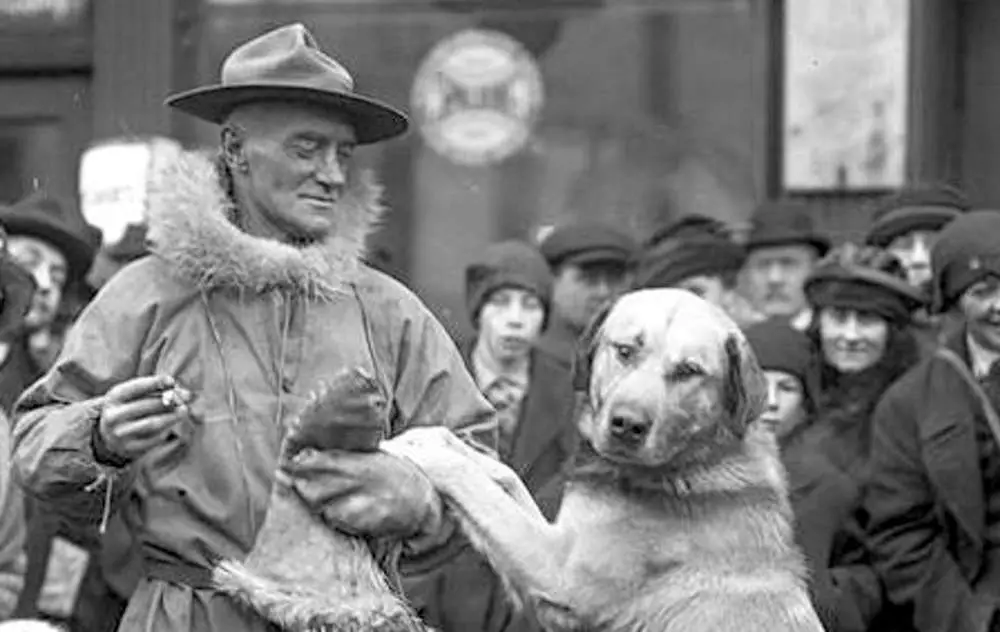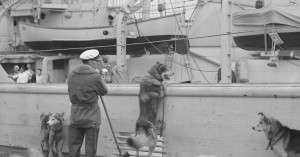In 1922, Arthur Walden checked into a New Hampshire hotel in Colebrook with Chinook, his dog, at his side. He informed the proprietor that the dog always slept at his bedside, and the pair went off to sleep.
Without Chinook, there would be no Arthur Walden legend and without Arthur Walden there would be no Chinook. Because Walden’s dog wasn’t just a Chinook, a breed of sled dog that is now the New Hampshire state dog, he was the first Chinook.
Arthur Walden was an adventurer. Born in 1871 and raised in the Midwest, his father, Rev. Treadwell Walden, was an Episcopal minister who moved to Boston in the 1870s. After completing school, Walden moved to New Hampshire to take up farming.
But he wanted more adventure. He pondered his next move and settled on either South America or Alaska. He tossed a coin, and Alaska won. By 1896, two years before the Yukon gold rush, Walden had made it to Alaska and for seven years he made a living, mostly by running freight to the mining camps via dogsled and the animals became his passion.
When he returned to New England, he brought his love of dogsledding with him. Settling in Wonalancet, N.H., a part of Tamworth, Walden bred a large mixed-breed mastiff, a farm dog, with a husky in 1917 and the result was the first Chinook. Walden named the dog after a sled dog he had in the Yukon of that name.
The Chinook was exactly what Walden wanted in a dog, friendly and gentle, but powerful, fast and possessing great endurance. Chinook was all these things.

Sled dogs working at the South Pole during Richard Byrd’s first Antarctic expedition. (Courtesy Leslie Jones Collection.)
Walden showed Chinook’s skills around New Hampshire, and he is credited with bringing the sport of dog sledding to New England, promoting early dog sled derbies in the 1920s that he and Chinook frequently won. But he was still eager for adventure, and at age 56 he persuaded Admiral Richard Byrd to accept his application to be in charge of the dogs on his Antarctic expedition of 1928.
Walden had one condition, though. On some past expeditions, once the mission was over some dogs had been left behind, abandoned. The dogs had to return, Walden insisted, or he would not go. Byrd agreed.
The South Pole
Walden had 45 dogs on his New Hampshire farm, and he would travel to Greenland for 30 more. His farm also served as a training center for human members of the team, too. Three Harvard students set to participate in the journey camped out in Walden’s pasture in the frigid January of 1928 to harden themselves for the journey.
Byrd’s plans to reach the South Pole were simple enough. He would travel by ship with animals and equipment, smash through the ice until he could land and establish a camp, which he dubbed Little America. From there he would go exploring using snowmobiles, dogsleds and planes, including one in which he conducted his first flight over the South Pole.

Arthur Walden and his Chinook
The dogs, meanwhile, were the freight haulers, shuttling goods to and from the camps. Though the trip made Walden famous around the globe, it was not the adventure he hoped for. It was monotonous, he told the media, so well-controlled and safe that it hardly seemed adventurous at all.
But it did leave a lasting mark on the aging man. Chinook, the dog Arthur Walden loved, died in the Antarctic. He simply wandered off to die at age 12, and upon his return Walden teared up discussing his old friend with the media.
‘He was my partner,” Walden said, “I wish I was half as good a man as he was a dog.”
By 1930 Walden’s dogs had returned to New Hampshire as heroes. Walden retired as a dog trainer and wrote books. He continued promoting the Chinooks. He would travel again to Alaska and return with exotic displays, but he did not accompany Byrd on any of his later trips. In 1947, he died in a fire at Wonalancet.
The Chinook breed at one point was quite popular, but its numbers dwindled to under 30 dogs in the 1980s, when breeders made a concerted effort to revive the breed. The Chinook breed is still alive today, though the animals are rare.
This story updated in 2022.


3 comments
The Chinook was named as New Hampshire’s state dog.
[…] Arthur Walden and a Dog’s Life of Adventure, New England Historical […]
[…] New England Historical Society: Arthur Walden and A Dog’s Life of Adventure […]
Comments are closed.